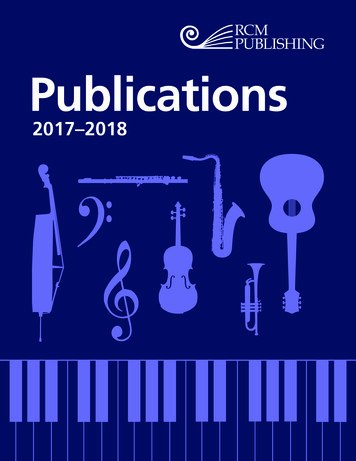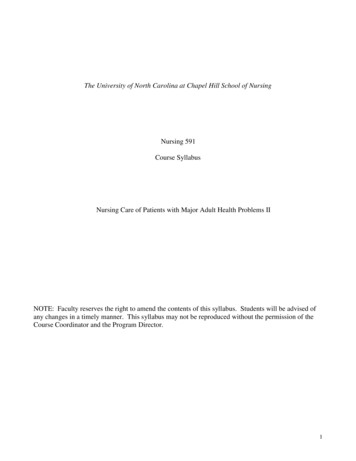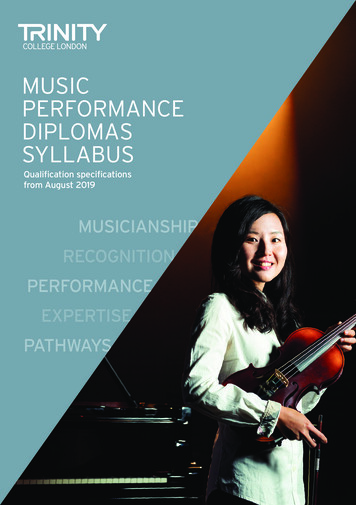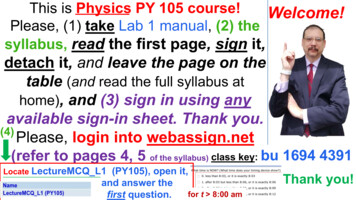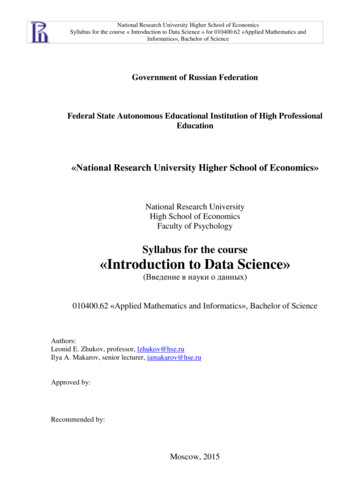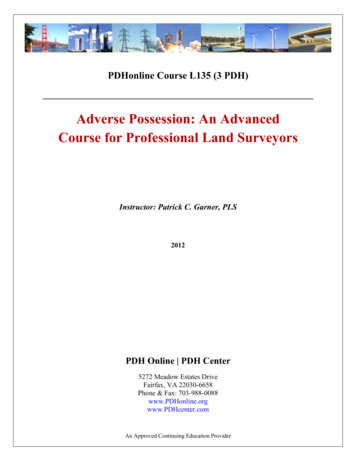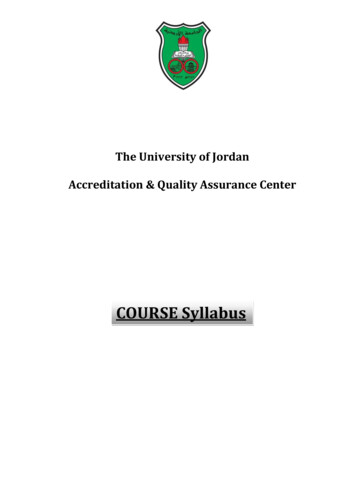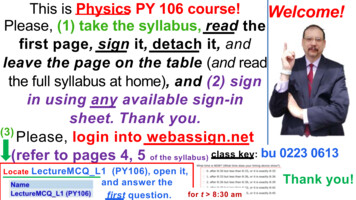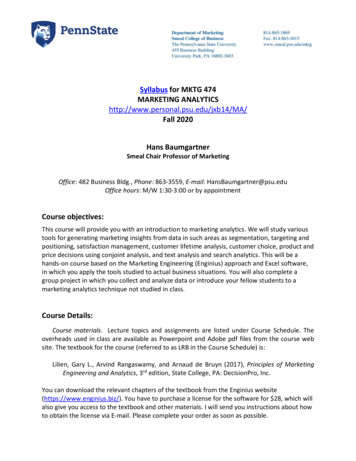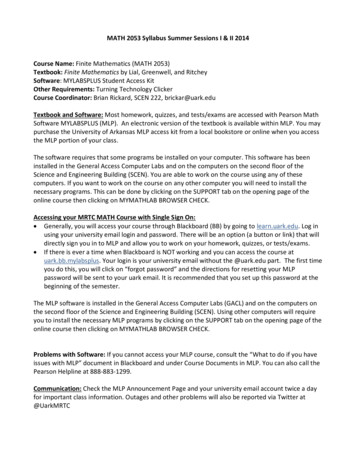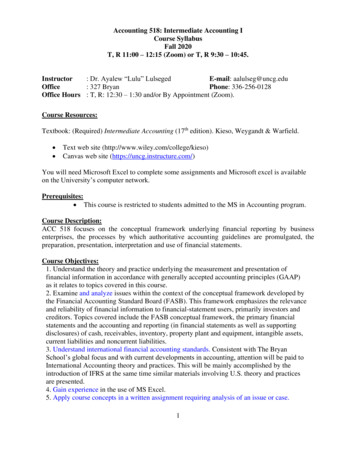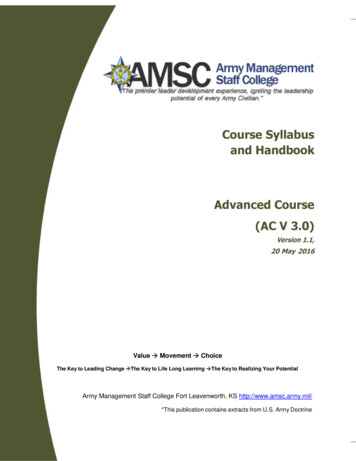
Transcription
Course Syllabusand HandbookAdvanced Course(AC V 3.0)Version 1.1,20 May 2016Value Movement ChoiceThe Key to Leading Change The Key to Life Long Learning The Key to Realizing Your PotentialArmy Management Staff College Fort Leavenworth, KS http://www.amsc.army.mil/*This publication contains extracts from U.S. Army DoctrineAC Course Syllabus and Handbooki
AMSC EmblemBuilding the Total TeamBlue, gold, bronze, and silver are the colors of the seal of the Army ManagementStaff College. Blue signifies loyalty, gold and silver denote value, and bronzeexcellence. The bronze torch symbolizes the strength and power of leadershipand education. The pen is a symbol of academics and studious endeavor. Thesword, in its strength, represents the total Army Team standing as a deterrent towar, between the torch and pen, as a symbol of its dependence on leadership,education and study. The two stars on the golden rim of the shield symbolize therank and responsibility of an installation commander.AC Course Syllabus and Handbook
Table of ContentsCourse Director’s Welcome .1Advanced Course Syllabus .2Course Description .2Learning Outcomes & Definitions .3Course Structure .3Course Scenarios .4Student Responsibilities .4Academic Integrity . 5AMSC Non-Attribution Policy .5Course Graduation Requirements .6Executive Coaching .7Assessments .7Attendance Policy .7Attire .8Class Hours .8Reassessment Policy & Procedures.8Student Computing Policy/Required Actions .8Student Dismissal/Release Policy .9Student Electronic Portfolio .10Student Led Events Guidance .10Appendix A: Advanced Sheets .12Appendix B: Assessments & Rubrics.13Assessments .14Appendix C: Course Schedule.19AC Course Syllabus and Handbook
Course Director’s WelcomeWelcome to the Civilian Education System’s (CES) Advanced Course (AC)! On behalf of theentire AC faculty and staff, thanks for taking valuable time away from your workplace and yourhome front to join us for a four (4) week journey into a leader development experience focusedon leader excellence in an environment characterized by ever increasing responsibilities andcomplexity. Unlike “training” opportunities you may have had during your career, this course isstudent-centered, instructor-facilitated and based on adult learning principles. Malcolm Knowles,the father of Andragogy (the study of how adults learn), theorized six principles of adult learning.Specifically, that adults learn best when their learning experience: 1) promotes self-direction; 2)connects to past experiences; 3) encourages goal setting; 4) offers a personal benefit; 5)appears useful; and 6) fosters respect.The course provides a mixture of individual assignments as well as team requirements. Asidentified by Peter Senge (The Fifth Discipline, 1990), team learning is the new unit of measurefor learning organizations. From my point of view – we facilitate leader development byinfluencing you and your leadership practices as opposed to teaching curriculum about being aleader.You will have the opportunity to maximize your learning by taking responsibility for yourlearning. Your facilitators are professional educators; and as such, will set the conditions forlearning by providing a safe, secure, and professional learning environment. They will ensure abalance between discovery learning and providing a content rich environment.My ultimate goal is that all AC graduates have a premier experience that will have positiveimpact on their organization and will make a difference in the lives of others. I want you to useyour influence to create a positive organizational environment while developing others andleading your organizations.As Organizational and Strategic Leaders, we apply our competencies to increasingly complexsituations and shape the Army through change over time. My expected outcomes are that you,the Aspiring Enterprise Leaders, secure National Interests, achieve Mission success, expertlylead organizations, steward resources and create healthy organizational climates.Army Strong!Robert E. Brunk, Ed.D.Director, CES Advanced Course, AMSCAC Course Syllabus and Handbook1
Advanced Course SyllabusCourse DescriptionThe CES Advanced Course prepares upper grade (GS 13-15) Army civilian leaders to assumeincreasing levels of responsibility and leadership within organizations through resident anddistributed learning methods. Our graduates are skilled in leading complex organizations insupport of national security and defense strategies; managing organizational resources; leadingchange; inspiring vision and creativity; directing program management and integrating Army andJoint systems in support of the Joint Force.The three major educational approaches of being Student Centered, Problem Based, andExperiential establish the foundation of how the Advanced Course helps students learn how tolead complex organizations in support of national strategies, and integrating Army and Jointsystems in support of the Joint Force. The Advanced Course faculty uses Army doctrine;educational and leadership theories; small group facilitation; and written papers and oralpresentations to support the three main educational approaches. Student Centered – All curriculum focuses on the transference of knowledge throughincorporating Life Long Learning with an emphasis on leading complex organizations. Thisfocus encourages students to incorporate “personal experience” as a key element in bothprofessional and personal leadership at the strategic level. Problem Based – The curriculum provides students with “real world – strategic” issues andproblems they will encounter as indirect leaders. Through collaborative learningopportunities with other leaders, students will develop or enhance additional skill sets to bemore effective leaders and managers. Experiential – Students “integrate” their new skills with their existing skills and abilities byusing an experiential education methodology containing activities and reflection. Thisintegration occurs in an environment of open discussion in the seminar room that enablesfeedback from peers and faculty.This course is built around principles for adult learning:1. Adults are motivated to learn as theyexperience needs and interests that thelearning will satisfy.2. Adult’s orientation to learning is lifecentered.3. Experience the richest source for adultlearning.4. Adults have a deep need to be selfdirecting.5. Individual differences among peopleincrease with age and experience.Adult learning:A process “ In which individuals take theinitiative, with or without the help of others, indiagnosing their learning needs, formulatinglearning goals , identifying human and materialresources for learning, choosing andimplementing appropriate learning strategies, andevaluating learning outcomes.”—Malcom Knowles, The Modern Practice ofAdult Education: From Pedagogy to AndragogyAs such, the expectation is for the learner toassume primary responsibility for the learning process. Our instructors will guide you throughAC Course Syllabus and Handbook2
the material, but cannot make you learn. While some of the content used in this course mayseem not relevant to what you do as an Army civilian, the content is often just a vehicle todevelop your skills in critical and creative thinking, team building, problem solving and decisionmaking, influence, self-awareness, leadership and Army Design Methodology. Our goal is not toteach you what to think, but help you to develop how you think, reason and solve problems. Attimes you will be asked to lead teams, at other times to follow and give others a chance todevelop their skills. We ask that everyone be respectful of the diversity and experience that eachperson brings to the course. There will be many opportunities to share experiences andknowledge and learn from each other, all under the deliberate guided coaching of yourinstructors.Learning Outcomes & DefinitionsThe AMSC Advanced Course is designed to produce Army Civilian Organizational andEnterprise-level leaders who can:AC LO 1: Lead a Large OrganizationEnterprise leaders must provide motivation and communicate purpose and direction in anambiguous and complex environment while building capacity for enhanced individual andorganizational performance. Leaders must be able to: model and influence the ArmyProfessional Ethos; demonstrate critical and creative thinking skills through effective problemsolving and sound decision-making; communicate complex ideas and achieve sharedunderstanding; develop mutually supportive relationships across the Army Enterprise; andnurture a learning environment that leads to trust, candor and resilience. Finally, leaders mustpossess a keen awareness of self, the organization, and the external environment in order tomake accurate assessments of organizational change.AC LO 2: Manage a Large OrganizationInherent in leading is the ability to get results by understanding the processes, systems andpeople within an organization and developing and coordinating these components to achievemaximum and effective output. The Total Army Analysis process is a tool for Army managers toanalyze, determine and justify requirements for the future force. Managers must understand andinfluence this process using sound analysis and decision-making to effectively plan, organize,staff, direct and measure organizational performance. Managers must be good stewards of theprofession by holding themselves and others accountable for making prudent decisionsregarding resources and expertise.Course StructureThe Advanced Course is centered on a complex and evolving problem scenario (CapstoneExercise) that is designed to achieve the Learning Outcomes by exercising the TerminalLearning Objectives (TLOs) at the three highest levels of Bloom’s Taxonomy; Analyze, Evaluateand Create. The TLOs and supporting Enabling Learning Objectives (ELOs) are described indetail in the lesson Advance Sheets found at Appendix B.In general, the course is focused around three (3) main themes or modules across 4 weeks.Weeks 1 and 2 are building Foundational Skills and Application, Week 3 focuses onAC Course Syllabus and Handbook3
Strategic Leadership and developing an Enterprise Wide Perspective and Week 4 focuseson How the Army Runs. Students will participate in Executive Coaching sessions with theirinstructors twice during the course and on the 19th day of the course provide a 15 minute leaderdevelopment plan brief to the seminar on what you learned and how you will apply it when youreturn to work.The Course Schedule (separate handout) lays out the flow of the course day by day.Course ScenariosThe Army Management Staff College uses scenario based instruction that immerses the studentin a realistic problem that forces learners to leverage skills in each of the lesson subjects listedabove. This course exercise runs throughout the course and involves a continuously changingscenario. The work is done as a seminar, and periodically you will have individual assignmentsas part of that seminar. You must work as a team, analyze a complex environment and acomplex problem set, develop operational approaches, make recommendations and map outArmy processes all while employing the skills taught in the Foundational module of the course.The Capstone Exercise: You are assigned as a member of the Advanced Course StrategicAnalysis Team for the Undersecretary of the Army. With changes in the Army operationalenvironment; budget reductions and drawdown; emerging threats from ISIS and other non-stateactors; emerging Army role in the Pacific; and a new Operational Concept for 2040, theSecretary of the Army and Army Chief of Staff have created a requirement to examine howArmy civilians are developed for the future. Specifically, they have asked “How should theArmy shape the future Civilian Workforce for Army 2040?You and your team will tackle this question and deal with the updates from the Undersecretary’soffice as changes arise. You will perform periodic in-progress reviews (IPRs), mostly within theteam and informal. Final out briefs to guest receivers will be formal.As the scenario progresses you will analyze a strategic leadership report and identify keyconcepts then work them into earlier recommendations. Finally you will work through the ArmyForce Management Model and outline what it takes to make your recommendations a programof record. The exercise concludes on Day 18 with a formal out briefing to the Undersecretary ofthe Army or their designated representative.Student ResponsibilitiesIn order to graduate from this course, you must: Meet course academic requirementsConduct yourself in a professional mannerBe at your place of duty at the specified timesDemonstrate integrityParticipate in Student Led EventsAC Course Syllabus and Handbook4
Academic IntegrityThe Army Management Staff College is committed to Army values as outlined in ADRP 6-22,Army Leadership. Inherent in these values is ethical conduct. You must uphold the higheststandards of academic integrity. Cheating, plagiarism in your oral or written work and interferingwith the work of others (disruptive behaviors such as withdrawal, interrupting, horsing around)constitutes violations of academic integrity. Ask your faculty members if you have questionsabout specific assignments or need additional clarity regarding academic ethical expectations.Bottom-line: Do your own work; be a team player; and hold yourself and othersaccountable, and you will find this course rewarding.You agree to uphold the Army Management Staff College Honor Code, the standards areoutlined below:AMSC Honor Code I will be truthful in my academic endeavors. Lying is the willful and knowledgeable tellingof an untruth as well as any form of deceit, attempted deceit, or fraud in any oral or writtenstatements relating to academic work. I will be honest in my academic endeavors. Cheating is inappropriate possession or useof copies of papers, examinations, solutions, or any other controlled issued material (e.g.pre or post assessments, tests, etc. ), whether as part of the DL requirements orthroughout the resident phase of the course. Inappropriate means that the College did notintend for you to have this material before the examination or performance of otheracademic work. If you accept copies of papers, examinations, solutions, or other controlledissued material from anyone except designated faculty at the designated time and do notcall this to the attention of AMSC personnel (Faculty, Course Director, Academic OperationsOfficer, Deputy Director and Director, AMSC) you are contributing to cheating. Contributingto cheating is the same as cheating, whether for others or for yourself. Possession or useof presentations from a previous course is also inappropriate. I will cite my work. Plagiarism is presenting another’s writing or ideas as your own and/orwithout appropriate citation of credit. This includes material extracted from written materials,the Internet, or any other source. Use of other learner’s, graduate’s, or author's work withoutappropriate citation or reference that this work belongs to another is stealing intellectualproperty. It is a form of cheating and lying. Using text written by another (short or long) whenyou know that it is not yours and not giving credit to the owner is a violation of the AMSCHonor Code. I will give prompt notification to my Faculty when I observe academic dishonesty. Ihave recourse to the Faculty, Course Director, Academic Operations Officer, DeputyDirector and Director, AMSC when I believe that insufficient action has been taken. I will model behavior that reflects the spirit of Army values. I will insist that my fellowlearners also model that behavior.AC Course Syllabus and Handbook5
Loyalty: Bear true faith and allegiance to the U.S. Constitution, the Army, your unit, andother soldiers.Duty: Fulfill your obligations.Respect: Treat people as they should be treated.Selfless Service: Put the welfare of the nation, the Army, and your subordinates beforeyour own.Honor: Live up to all the Army Values.Integrity: Do what’s right, legally and morally.Personal Courage: Face fear, danger, or adversity (physical or moral)AMSC Non-Attribution PolicyThe AMSC non-attribution policy can be summarized as follows: what happens in the classroomstays in the classroom. Academic freedom is a fundamental feature of the adult learningenvironment. AMSC encourages free and open discussion and exchange of ideas in theclassroom. Nothing visitors say while visiting AMSC will be attributed to them personally, eitherdirectly or indirectly, by any person. The name of a former visitor will not be used when askingquestions or developing discussions with a later visitor. Views of an earlier visitor, whether inagreement with or opposed to those of a later visitor, will not be attributed to the former visitor byname, position, or title. Nothing a visitor says will be attributed to him/her in discussion with anynews media, public forum, or in any other way. This policy applies to all staff, faculty, andstudents.Course Graduation RequirementsDistributed Learning Phase Prerequisites: (Individual Requirements) Complete DL prior to resident Phase AttendanceMulti-Source Assessment and Feedback (360) – (If one is not done prior to Resident Coursearrival then it is expected that one will be initiated prior to departure from the course)Resident Phase Requirements: (Team & Individual Requirements)Prior to Arrival at the Resident Phase: Visit the Blackboard website and become familiar with itComplete the Course Pre-Assessment in BlackboardComplete all assessmentsTeam Requirements: Complete all exercise requirementsIndividual Requirements: Multi-Source Assessment and Feedback (360)Participate in coaching sessions with your instructorAC Course Syllabus and Handbook6
Conduct Self & Peer AssessmentsWriting Requirement # 1Writing Requirement # 2Individual Leader Development Plan Presentation for Day 19Participate in student led eventsDaily Leadership Journal CompletionExecutive CoachingYour assigned faculty member will convene at least two coaching sessions with you during thecourse: Initial coaching will be conducted in Learning Groups.Mid-Term course coaching will be conducted individually and will focus on your courseprogress; your strengths and areas for improvement; your personal goals; and feedbackfrom your facilitator / coach regarding your individual and team deliverables. Final coaching is your Leader Development Plan Presentation, completion of yourleadership Journal, and final feedback from your peers and Facilitator / Coach.Assessments Multi-Source Assessment and Feedback (360).Self & Peer Assessments.Leadership Journal entries.Writing Requirements (Essays).Oral Presentations.Group/Team work.Selected assessments are explained in more detail in Appendix B: AssessmentsAttendance PolicyIt is mandatory that you attend all scheduled activities, unless properly excused by the CourseDirector. Your instructor will not tolerate unexcused absences or tardiness. You may be subjectto administrative action based on an unexcused absence or tardiness. You must resolvecommitments that conflict with the College’s expectations before arriving. In emergencies, youmay miss certain learning activities without having to drop the course, while other learningactivities are mandatory, and you will have to make up those requirements in order to graduate.Except for students who reside in the Fort Leavenworth commuting area, you are required to bea resident at the school while attending CES courses. The daily academic schedule featureseight hours of in-class work, although many study days may be longer and homework needed toprepare for the following day. Absences due to Emergencies: In the event an emergency causes you to miss instruction;you must contact one of your instructors as soon as possible. If you cannot reach anAC Course Syllabus and Handbook7
instructor, contact the Academic Student Support Team at 913-758-3576 and provideinformation concerning the circumstances surrounding the emergency. Absences due to Non-Emergencies: As a general policy, you are not authorized to missclass for personal/non-emergency reasons. However, upon proper justification, the CourseDirector may allow up to eight (8) hours of missed class. If excused from a class, you mustsatisfactorily complete all missed activities and assignments. You are responsible forcoordinating with your instructors regarding the completion of missed work.Attire The uniform of the day is business casual; ACUs for military personnel. Graduation Ceremony requires business professional attire; ASUs for military personnel.(This may be altered based on climate conditions per direction of the AMSC or AdvancedCourse Director.)Class HoursThe class schedule is 0800 to 1630 hrs. (8:00 AM to 4:30PM) unless specified otherwise.Reassessment Policy & ProceduresInstructors assess students’ assignments on a “pass/fail” basis. Examples of “fails” includefailure to complete an assignment, or pre/post-assessment; scoring less than 80% against anestablished rubric for writing / presentation requirements; or missing more than eight (8)approved hours of absence from instruction. The AC Director will assess students who receive a“fail’ to determine fitness for retention in the course.Student Computing Policy/Required ActionsGuest AccountsAs you begin class at AMSC you will undoubtedly notice that you are using a NIPRnetcomputer, because of this there are some issues that will affect some of you.Many of you will receive “guest accounts”, this is caused by your Major Command not beingTRADOC.1. Login in to your machine using your CAC Card at 0900. This will timestamp your guestaccount if you have one.a. The machine may not recognize your credentials, IE: Windows could not verify yourcredentials.b. If so please attempt to login again, this will create a DoD guest account, your screen willhave a solid blue background with a DoD visitor warning. In this mode you will not beable to save to your computer, browsing the Internet will also require approval.2. Once you have logged in, please log out of your machine.AC Course Syllabus and Handbook8
a. For those of you who are guest accounts, we will attempt to move these createdaccounts to a more controlled environment. This environment will give us more control ofyour account. Further it will allow you to print and also save to your computer.3. If you have not supplied the required training, AUP and DoD SAAR 8570 before class, thenthis will have to be collected at this time, if you are a DoD guest.4. Provided that everything goes according to plan you should have a full account by themorning of the second day.Logging Off/End of Day1. At the end of the day, please ensure that you log off your computer.2. Please make sure that you leave the computer powered on.a. If you fail to leave the computer powered on it will not receive updates.Printers and Copiers in the Classroom1. Printers and Copiers are provided for your use.a. Please limit printing to necessary classroom related activities.b. Printers will be provided with a set amount of paper. Your instructor will have to requestmore paper if this is needed.Blackboard: Blackboard is located at: https://www.amsc.blackboard.com/Wireless1. There is a commercial wireless network available in the building. To connect to this choosethe wireless network. Once you have chosen this agree to the terms.2. You are not authorized to use the NIPR computers to connect to the wireless in the building.Connecting to wireless with a NIPR computer is a violationStudent IT Support1. Student IT support is available by calling, 684-5700 and specifying your room and issue.2. For immediate response have your instructor contact the AMSC IT office.Student Dismissal/Release PolicyUnder certain conditions, students may be dismissed or released from the course before coursecompletion. Students may be considered for dismissal for the following: Compassionate reasons (illness, injury, family emergencies or other reasons beyond thecontrol of the individual)Academic deficiency (cheating, plagiarizing, unexcused absences, or failure to turn inassignments)Personal conduct (repetitive disruptive behavior that interferes with safe learningenvironment for other students, or academic integrity violations)AC Course Syllabus and Handbook9
Disenrollment for compassionate reasons beyond the control of the individual will be madewithout prejudice. The student will be eligible to re-enroll as soon as conditions that led todisenrollment no longer exist.Dismissals for academic deficiency and personal misconduct will result in the AC Directorcontacting the student’s supervisor to provide justification for removal and determination ofrecycling or permanent dismissal from CES program.Student Electronic PortfolioWhile attending the Advanced Course, students will maintain an electronic portfolio inBlackboard. A portfolio is a collection of student work (individual and group) that depicts astudent’s academic activities, self-reflection and work products. It also contains some contentgenerated before attending the course.The portfolio helps illustrate student talents, represents your writing capabilities, and basicallytells the story of your achievement. Because you will complete several self-assessmentinstruments and maintain a daily journal, these items are also part of your overall portfolio. Allcontent in your portfolio with the exception of your student folder are private and accessible onlyby you and the instructor. Note that your portfolio is viewable in Blackboard for 90 days after theend of the course.Your student portfolio is structured in three parts as depicted in the following table: Advance Course Student PortfolioGradebookStudent FolderPre-Course Assessment Group work products Initial coaching Misc.1st writing requirement Mid-term coaching 2d writing requirement Leader Development PlanPost-Course Assessment InstrumentsMSAFMBTISDIPeer assessmentsLeader DevelopmentWorkbookLeadership JournalStudent Led Events GuidanceStudent Leadership – At the beginning of the day, students will facilitate a review and previewof the previous and upcoming day, inviting their peers to share key learning points and momentsand to connect the previous day with the upcoming day. The students coordinate the dailyactivities of the seminar. They will address the major activities of the day with their peers in theseminar, with the instructors, and with other seminars. They will coordinate student-centeredactivities such as timing of breaks, length of breaks, lunch, etc.After-Action-Review – The purpose of the student-led AAR is to practice the skills that arepresent in a learning organization by facilitating a discussion/review of a recently-completedactivity. A quality AAR will feature an examination of both "Content" (task accomplishment) and"Process" (interpersonal, teamwork, emotional reactions), as they relate to the AdvancedCourse Goals and the directions in the Problem Charge. A future focus that addressesapplications of lesson learned will help students internalize valuable learning points.AC Course Syllabus and Handbook10
In-Progress-Review – The purpose of the student-led IPR is to practice the skills that arepresent in a learning organization, by checking the progress of an on-going activity in theseminar. The
AC Course Syllabus and Handbook AMSC Emblem Building the Total Team Blue, gold, bronze, and silver are the colors of the seal of the Army Management Staff College. Blue signifies loyalty, gold and silver denote value, and bronze excellence. The bronze torch symbo
